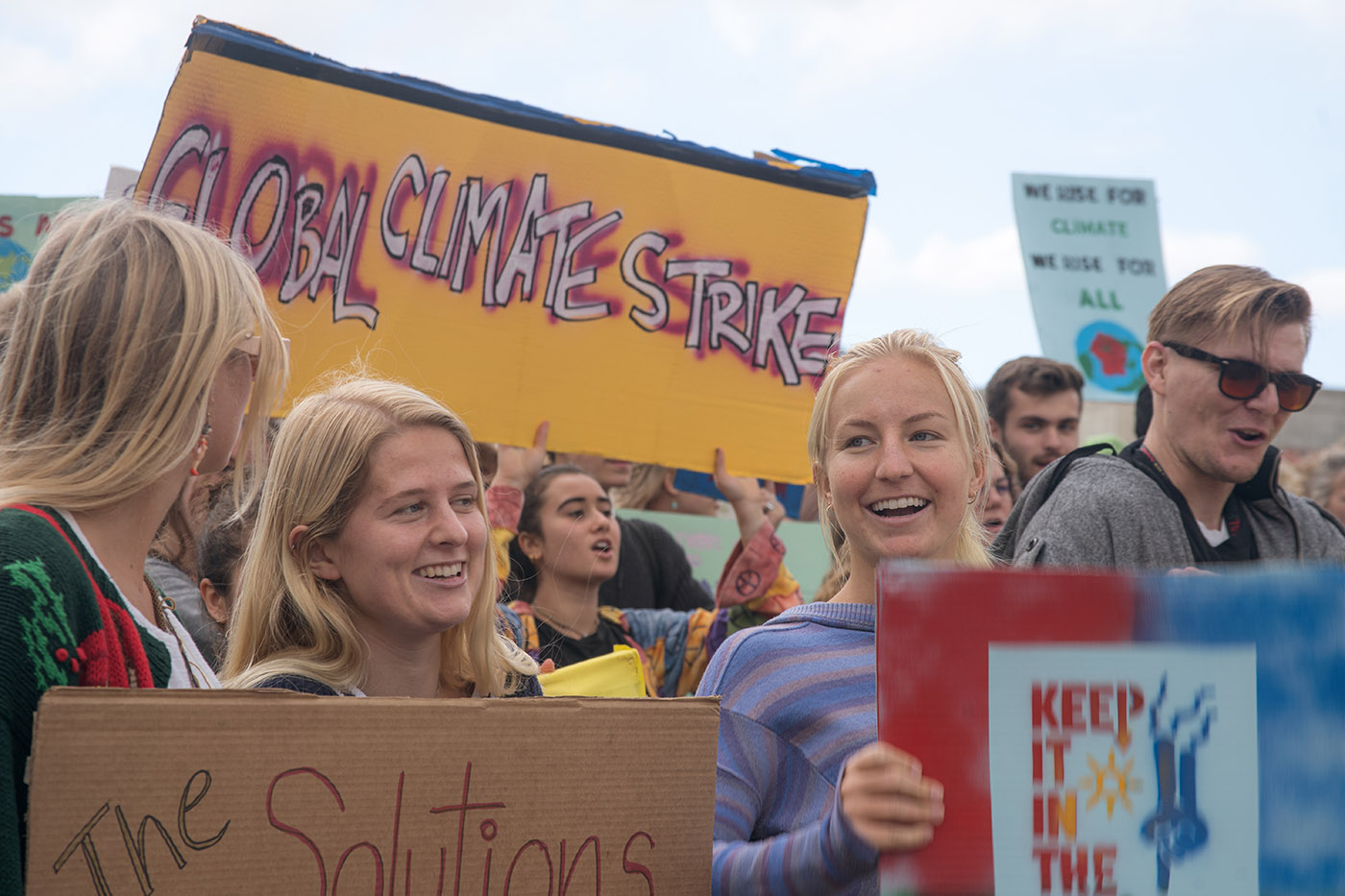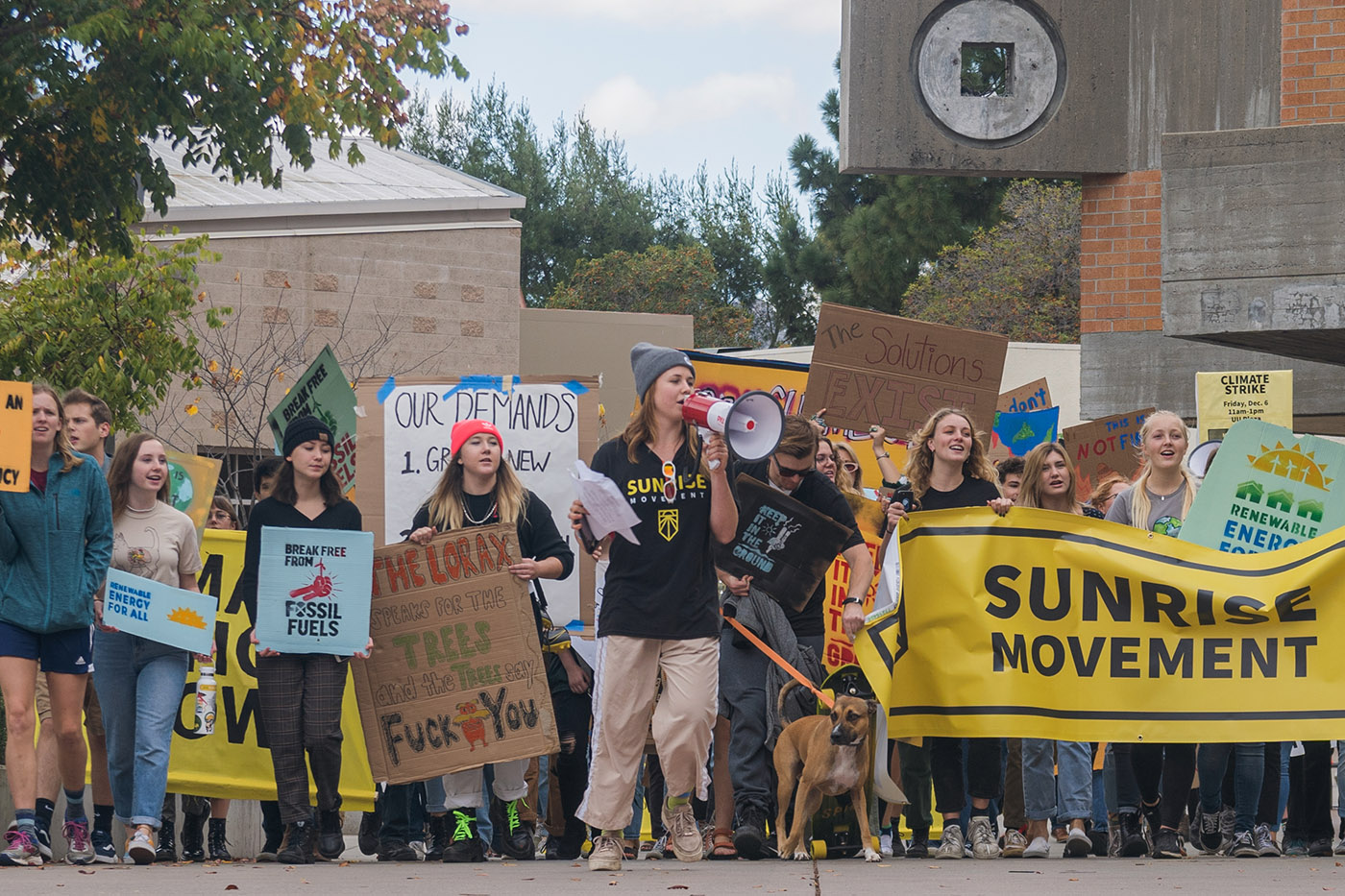Students traded their notebooks for picket signs and swarmed the University Union to protest climate change inaction Friday, Dec. 6.
Sunrise SLO, an organization dedicated to creating a movement against climate change, planned the strike to compel government officials to create policy to combat climate change.
“We are building an army of young people to make climate change an urgent priority across America and end the corrupting influence of fossil fuel executives on our politics,” strike organizer and city and regional planning freshman Declan Galli said. “[We want to] elect leaders who stand up for the health and wellbeing of all people.”
Nine students affiliated with Sunrise SLO planned the protest. Galli, who has already organized two climate strikes, was among them. Sunrise SLO calls the youth of the nation to take action to save the environment, according to their website.
“I think it’s crucial and essential and also really disappointing that the so-called ‘adults’ – my generation and [those] above me – have not done what needed to be done in order to ensure that these kids have a vital and thriving planet to live on,” San Luis Obispo Mayor Heidi Harmon said. “Now young people are having to step up and take a stand where their parents and grandparents were not able to.”
About 60 people attended the event. Most were students.
“It shows that we’re the generation that does care, so it gives you hope,” environmental management and protection sophomore Jesse Stewart said.
Sunrise SLO used the strike to assert their demands, including:
- Nancy Pelosi support the Green New Deal and create thousands of jobs.
- Gaven Newsom support a Green New Deal for California.
- SLO County join Monterey Bay Community Power.
- Cal Poly adopt a universal compost system.
- The Respect of Indigenous Lands and Sovereignty.
- Environmental justice for all people.
- The protection and restoration of biodiversity.
- An implementation of sustainable agriculture
To achieve these goals, members of Sunrise SLO encouraged protestors to contact their elected officials and vote for environmentally friendly candidates.
“It’s not just going to be about whether you recycle your bottle or whether you do small things throughout your life,” event organizer Jazlyn Guerrero said. “They are important, but it’s really important to be politically active and try to work on getting policy and getting elected officials who are going to make changes, because that’s where there’s a lot of power.”

Outside of the strike, the Cal Poly Democrats club set up a voter registration booth where they promoted registering to vote in San Luis Obispo.
“Sometimes local decisions, like the way a city decides to act, can inspire more state and even national governments,” logistics coordinator of the strike Katie Rose said. “It needs to be a top down movement, but also a bottom up [movement], and I think just working together will make it increase at a faster rate, so I think they’re both equally important.”
Sunrise SLO also publicly endorsed Ellen Beraud, who is running for the District Five seat on the county Board of Supervisors. In her speech at the strike, Beraud has promised to reject campaign donations from the fossil fuel industry and bring the Green New Deal to the Central Coast.
Cal Poly students — which includes yakʔitʸutʸu residents — comprise 25 percent of District Five, according to Beraud.
Sunrise SLO strike organizer Emmet Arries said that it is important the county elects leaders that will prioritize environmental issues.
“We want politicians that will fight alongside us,” Arries said. “We need a county government that’s forward thinking and cares about the future of our planet … We need action from our political leaders, and it needs to be more than just Ellen.”
Sunrise SLO held a question and answer panel with Cal Poly professors for attendees to ask questions related to the science of climate change.
The panel included Cal Poly Center for Sustainability director Hunter Francis, physics professor Pete Schwartz, marine science professor Ben Ruteburg, Sunrise SLO advisor and mathematics professor Erin Pearse, mathematics professor Charles Camp and Galli.
“I think it’s just important for students to feel like they can ask people who they trust [about climate change] and get highly factual, highly trustworthy explanations of the science that’s involved,” Guerrero said.
Harmon said she considers the fight against climate change to be not only a political and scientific movement, but it is a spiritual movement as well.
“I would also say that the climate crisis is a deeper issue, and that to me is really more a spiritual crisis of separation. … That illusion of separateness allows us to treat the environment the way we do,” Harmon said. “We need to allow for communities and people to be supported and to be connected.”
One of the student organizers agreed.
“Everything in the world is kind of connected,” Rose said. “We don’t own the natural world, and I think that ownership has been prevalent throughout parts of history of humanity, and I think that we need to change — shift — the paradigm in that respect. We are part of nature, and I believe that everything should be equalized.”

